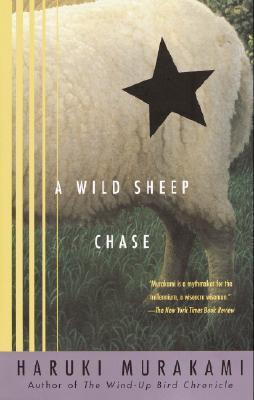It's not something I can explain in words. It's like, well, like a blast furnace that smelts down everything it touches. A thing of such beauty, it drives you out of your mind. But it's hair-raising evil. Give your body over to it and everything goes. Consciousness, values, emotions, pain, everything. Gone. What it comes closest to is a dynamo manifesting the vital force at the root of all life in one solitary point of the universe.Does that quote make everything clear? I would call myself a fan of Haruki Murakami, but A Wild Sheep Chase -- the author's first American release -- didn't quite work for me. Billed as a "hybrid of mythology and mystery", this book certainly hints at the elements that I found to be genius in Murakami's later works, but in the end, it didn't go far enough. There is definitely interesting writing, the descriptions of Japanese settings and lifestyle were intriguing, and I was invested in the characters, but this didn't really work as either a detective story or as a toedip into the truly surreal; what I've grown to love about Murakami's writing. But, as in the unnamed protagonist's meandering journey to find a mutant sheep, the reader can find many tasty morsels along the way and the trip itself -- if not the destination -- can be its own reward.
If the mutant sheep is supposed to be a metaphor for something important (I see people think of it as consciousness or post-WWII Japan or "the meaning of life" or…), then it's a metaphor that's obscured rather than revealed by the text. Murakami used many similes and metaphors that defied interpretation, and while these felt like a joke on the reader, it was a joke I rather enjoyed (even if these examples are inherently meaningless to me):
Her face had no expression, like a photograph of a sunken city on the ocean floor.And the following quotes I found straight out funny:
He stood by the entrance and scarcely moved. Reminded me of a street washed clean after a downpour.
His long fingers suggested nothing so much as a troop of animals that had retained deep primal memories despite long years of training and control.
An odd house the more I looked at it… As if a great creature had grown old without being able to express its feelings.
Age certainly hadn't conferred any smarts on me. Character maybe, but mediocrity is a constant, as one Russian writer put it. Russian writers have a way with aphorisms. They probably spend all winter thinking them up.
The sofa was an unappealing orange, the sort of orange you'd get by leaving a choicely sunburnt weaving out in the rain for a week, then throwing it into the cellar until it mildewed. This was an orange from the early days of Technicolor.A Wild Sheep Chase is #3 in a trilogy (The Rat Series) and the first two books in the series are out of print (so does that mean it's still a trilogy?). I read this after Dance, Dance, Dance (considered #4 in the trilogy) -- which has some of the same characters and settings, including the protagonist, and the same noir tone -- and my understanding and enjoyment weren't affected by reading them out of order. In the final analysis, Dance, Dance, Dance was a much more sophisticated and literary version of A Wild Sheep Chase and this book would probably only be interesting to fans of Murakami's better works; as a point of comparison if nothing else.

